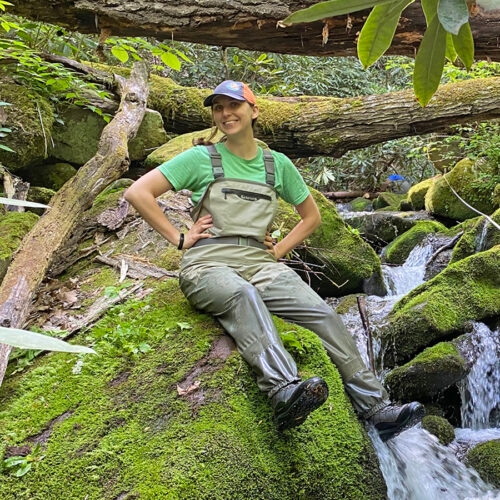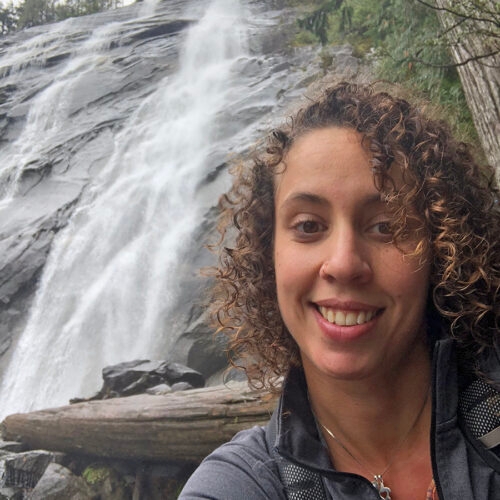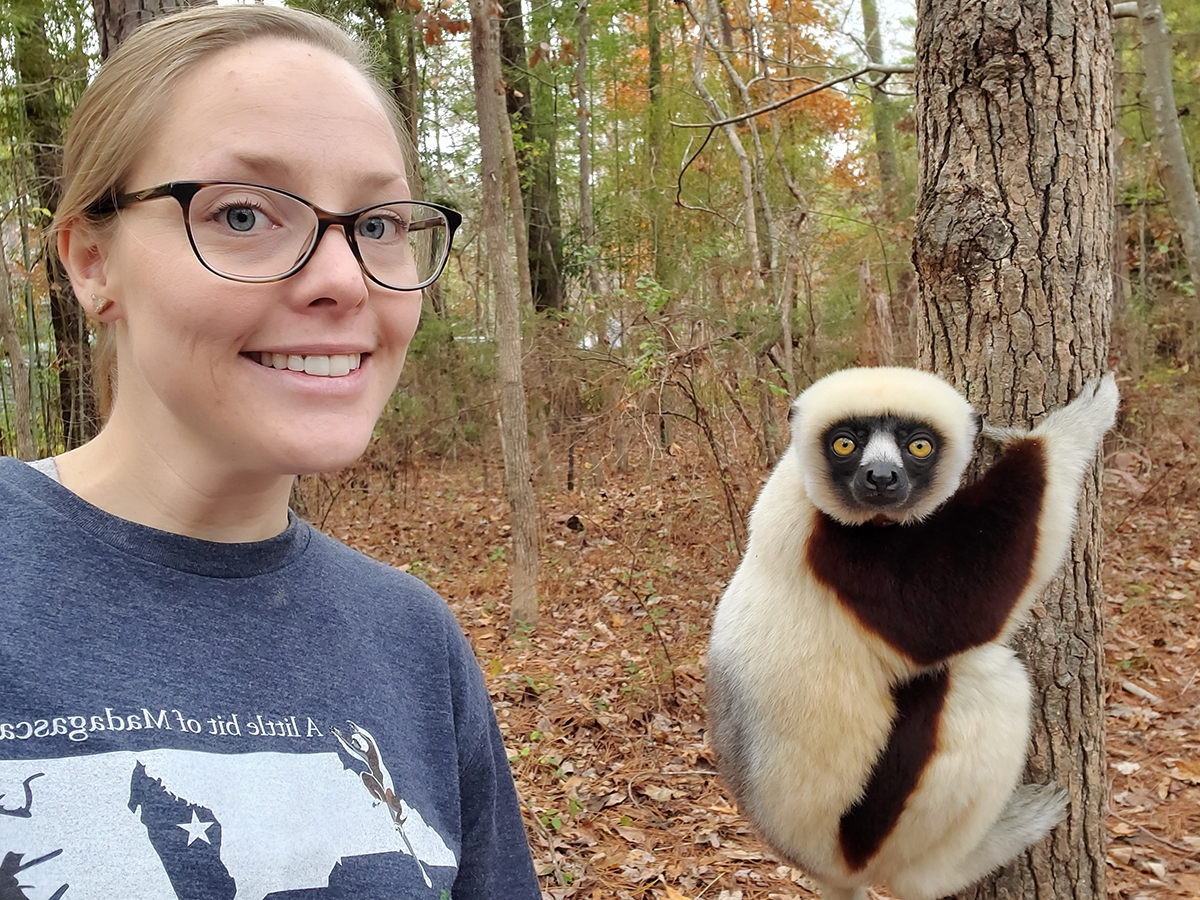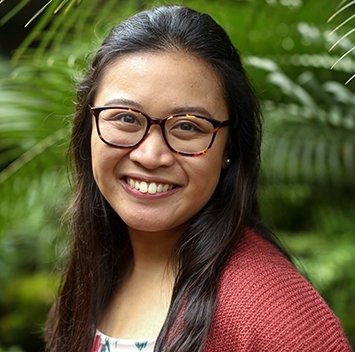Congratulations to IGC IGEP 2021-22 Global Change Interdisciplinary Graduate Assistantship Awardees!
July 28, 2021
The Interfaces of Global Change IGEP awards four Ph.D. fellowships every academic year, each covering tuition and stipend. These graduate research assistantships are awarded based on the student’s professional credentials, the student’s level of engagement in the IGC IGEP, pertinence of the student’s research to global change, the interdisciplinary nature of the work, and the student’s plan for using the one-year fellowship.
Please join us in congratulating Chloe Moore, Luciana Alves Pereira, Meredith Semel, and Sara Teemer Richards – recipients of this year’s IGC Fellowships! Read about each Fellow below.
Redundant or complementary? Identifying patterns of multifaceted anuran biodiversity in the United States
Chloe More
DEPARTMENT OF BIOLOGICAL SCIENCES
Faculty Mentor: Dr. Meryl Mims

“I am interested in disentangling the processes underlying patterns of biodiversity and identifying why species occur where they do to improve biodiversity conservation efforts. Many species’ habitats are under threat from global change, such as habitat loss, climate change, and invasive species. Through my research, I aim to inform local communities on the complexities of biological variation around them. To build species distribution models predicting where anuran (frog and toad) species occur, I use community science occurrence databases, such as iNaturalist. In Spring 2019, I was the herpetology leader for the Blacksburg City Nature Challenge, the local contribution to a global iNaturalist event. Using the Hidden Rivers event as inspiration, my plan is to further involve the Blacksburg community by facilitating an event combining community focused occurrence collection and discussions of how we can measure and conserve our local biodiversity.”
Receiving this fellowship will allow Chloe to expand her interdisciplinary research by incorporating genetic data into her investigation of biodiversity. It will also aid her in planning the iNaturalist outreach event with the Blacksburg City Nature Challenge and VT Science Festival.
Movement, population structure, and growth of shovelnose catfishes Pseudoplatystoma in the Amazon Basin
Luciana Alves Pereira
DEPARTMENT OF FISH AND WILDLIFE CONSERVATION
Faculty Mentors: Dr. Leandro Castello and Dr. Eric Hallerman

“My research is interdisciplinary and relates to global change as it integrates ecology, genetics, and conservation to help solve the problem of overexploitation and habitat degradation in the Amazon Basin. I am studying the migration of two Amazonian species of catfish, Pseudoplatystoma fasciatum, and P. tigrinum. These catfish are threatened by widespread illegal fishing and construction of hydropower dams that block their migratory movements. Despite these threats, their migrations have not been studied. I am addressing two questions: 1) What is the migration ecology of P. tigrinum and P. fasciatum and, 2) do P. tigrinum and P. fasciatum possess homing behavior? My research will thus produce knowledge needed to develop science-based policies to sustainably manage and conserve these catfish.”
The IGC fellowship will enable Luciana to more rapidly advance her research, coordinate field sampling of catfish in the Amazon, and build expertise and knowledge towards completing her thesis. She also plans to apply communication skills gained through the IGC to develop a workshop with the purpose of informing results from her research to key stakeholders, including the fishing community, government officials, and hydropower companies.
Conservation of wild lemurs: using poop, technology, community outreach, and entrepreneurial activities to conserve a critically endangered species
Meredith Semel
DEPARTMENT OF BIOLOGICAL SCIENCES
Faculty Mentor: Dr. Ignacio Moore

“My strong desire to work at the interface of science education and international conservation (specifically in Madagascar) drove me to attend graduate school at Virginia Tech and to engage with the IGC program. The IGC program has provided me with the science communication and policy skills needed to be successful. My graduate research investigates the influence of environmental and anthropogenic factors on lemur social behavior, movement, stress physiology, and conservation planning with a focus on the critically endangered golden-crowned sifaka (Propithecus tattersalli). To that end, I have completed four field seasons in the Loky-Manambato Protected Area of northern Madagascar, during which I collected over 2,000 fecal samples, 110 plant samples, and 4,000 hours of behavioral data from sifaka groups across their entire global range.”
This fellowship will allow Meredith to complete three new collaborative projects directly related to her dissertation work: 1) understanding the structure of the golden-crowned sifaka gut microbiome, 2) designing specialty housings for novel lemur GPS collars, and 3) continued local outreach in Madagascar and initiation of new entrepreneurial activities.
Effects of temperature on behavior and disease transmission in house finches
Sara Teemer Richards
DEPARTMENT OF BIOLOGICAL SCIENCES
Faculty Mentor: Dr. Dana Hawley

“Widespread transmission of infectious disease has the ability to bring the world to a devastating halt, and simple interactions between healthy and infected individuals can alter life for millions. Yet, we still know little about which behaviors influence infectious disease spread in non-human animals, and how those change with environmental factors. My work uses a contact tracing method–fluorescent powder that can be detected in trace amounts with a UV light–to reveal the links between environmental factors, behavior, and contact rates in a wildlife host system subject to outbreaks of a deadly infectious disease. House finches are a common songbird species in the United States that experience seasonal outbreaks of conjunctivitis caused by the bacterium Mycoplasma gallisepticum. However, little is known about the factors affecting transmission of this disease. Understanding the nuances of conjunctivitis transmission in finches can give insight to other diseases, especially when considered in the context of a rapidly changing world.”
The IGC Fellowship will provide Sara much needed financial and logistical support and will allow her to focus on interdisciplinary research and science communication efforts. Outside of the experiments and lab work, she looks forward to presenting her work at local and national conferences, as well as mentoring and training new undergraduate and graduate students joining the lab.
The Interfaces of Global Change (IGC) program is an innovative interdisciplinary graduate education program designed to address the multidimensional aspects of global change. Funded by the Virginia Tech Graduate School with additional support from the Fralin Life Sciences Institute (FLSI), this program is one of several Interdisciplinary Graduate Education Programs (IGEPs). These programs address a variety of complex societal issues requiring interdisciplinary teams of scholars. Participants (Ph.D. Fellows) typically enter the program at the beginning of their graduate studies and continue to participate throughout their time at Virginia Tech.
The Interfaces of Global Change program is closely aligned with the Global Change Center, one of four campus-wide research centers housed within FLSI, which focuses on the social, economic, and environmental causes and consequences of rapid global change.







